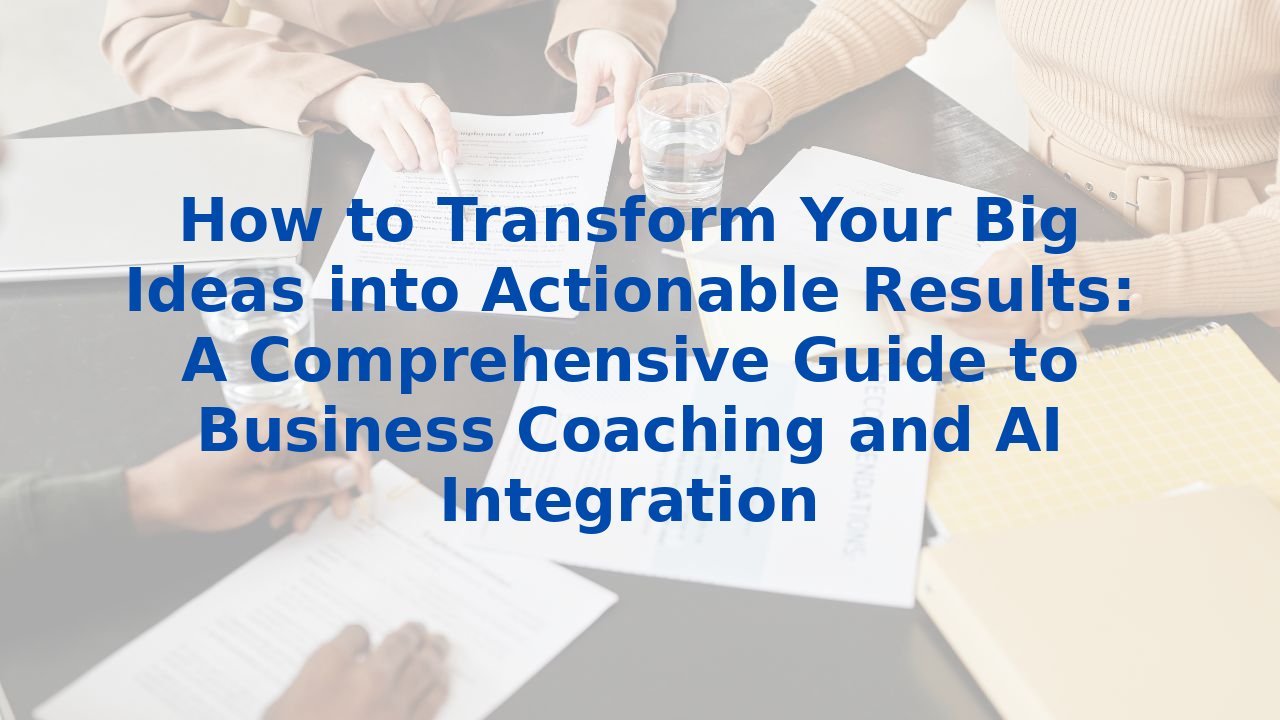How to Transform Your Big Ideas into Actionable Results: A Comprehensive Guide to Business Coaching and AI Integration
How to Transform Your Big Ideas into Actionable Results: A Comprehensive Guide to Business Coaching and AI Integration
Introduction
In an age defined by rapid change and relentless competition, the ability to turn big ideas into actionable results is more crucial than ever. Business coaching paired with innovative tools—such as Artificial Intelligence (AI)—can transform the way we approach these challenges. It's about redefining the possible and utilizing the resources at our fingertips to streamline processes, boost productivity, and drive tangible outcomes.
What is AI in Business Process Management?
At its core, AI in business process management is about harnessing advanced technologies to build, analyze, automate, and optimize workflows. Traditional business methods often struggle under the weight of data, decision-making needs, and process complexity. This is where AI shines, enabling organizations to swiftly analyze extensive data, identify emerging trends, forecast outcomes, and automate routine tasks—all of which serve to fuel informed decision-making and organizational agility.
The Role of AI in Business Process Management
AI plays a transformative role across three critical dimensions: data analysis, process building, and automation.
- Data Analysis: Imagine sifting through vast amounts of data effortlessly. AI can highlight patterns, facilitate strategic insights, and empower leaders to make informed decisions with remarkable speed.
- Process Building: AI's capability to create efficient workflows based on user-defined parameters ensures that businesses operate with optimal efficacy, saving precious time and resources.
- Automation: Automation isn't just about speed; it reduces human error and allows employees to focus on what truly matters. Embracing automation liberates teams from mundane tasks and drives creativity and innovation.
Benefits of Integrating AI into Business Processes
The integration of AI in business processes offers compelling benefits:
- Improved Efficiency: By automating repetitive tasks, AI frees up team members to focus on strategic decision-making, ultimately enhancing productivity.
- Enhanced Decision-Making: With AI's predictive analytics, businesses can anticipate customer behaviors and optimize pricing strategies, ensuring informed tactical decisions that align with organizational goals.
- Optimized Customer Experience: Analyzing real-time feedback enables businesses to respond intuitively, providing customers with timely and relevant insights.
- Streamlined Processes: AI's ability to generate up-to-date process maps fosters clarity and alignment across teams, ensuring everyone is moving toward shared objectives.
Real-World Applications of AI in Business
The versatility of AI means it can be applied to diverse sectors:
- Sales and Marketing: Through data analysis, AI supports inventory management, optimizing advertising strategies, and understanding consumer behavior more comprehensively.
- Human Resources: Recruitment processes can be streamlined with AI tools that conduct preliminary assessments, saving time and resources.
- Manufacturing: AI enhances operational efficiency by identifying anomalies in real-time, thereby predicting and managing demand intelligently to maintain robust supply chains.
The Necessity of Employee Training for AI Integration
The power of AI can only be fully realized when employees are equipped to work alongside these technologies. Here’s why training is beneficial:
- Adaptability: As AI technologies evolve, employees must understand how to navigate and integrate these tools into their jobs seamlessly.
- Efficient Utilization: Training ensures employees are adept at leveraging AI for maximum productivity, translating to smarter decision-making and efficient processes.
- Continuous Growth: As AI capabilities expand, so too must the skills of your workforce. Continuous training empowers teams to harness new insights, driving sustainable improvement across the organization.
Conclusion
Transforming big ideas into actionable results requires a roadmap that intertwines strategic business coaching with the cutting-edge power of AI. By automating processes, enhancing decision-making, and refining customer experiences, organizations can foster an innovative culture that not only attracts talent but also propels success. Meanwhile, investing in comprehensive employee training will fortify this transformation, ensuring your workforce is prepared to navigate future challenges. This dual approach isn't merely an option; it's a necessity for driving meaningful results in today's dynamic business landscape.
Embrace the possibilities, foster a culture of innovation, and watch as your organization evolves into a powerhouse of efficiency and creativity.



